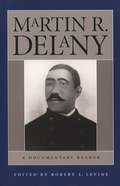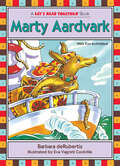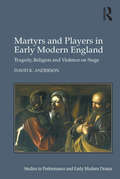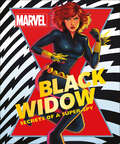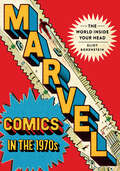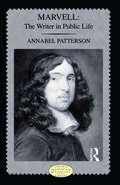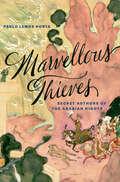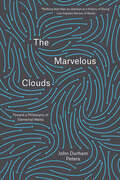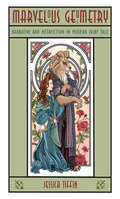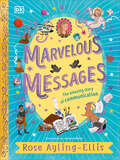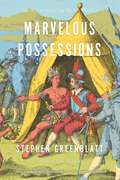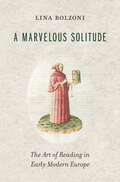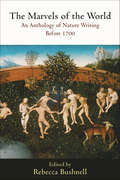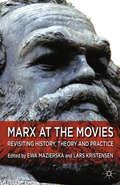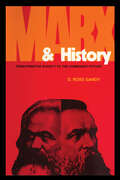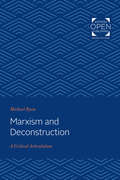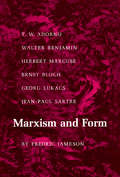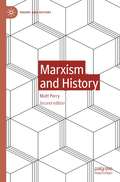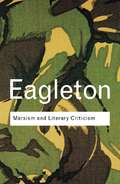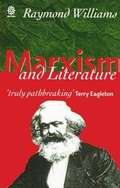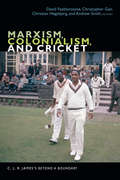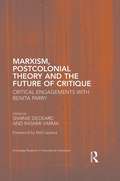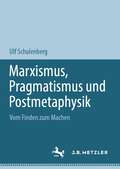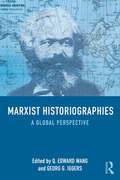- Table View
- List View
Martin R. Delany
by Robert S. LevineMartin R. Delany (1812-85) has been called the "Father of Black Nationalism," but his extraordinary career also encompassed the roles of abolitionist, physician, editor, explorer, politician, army officer, novelist, and political theorist. Despite his enormous influence in the nineteenth century, and his continuing influence on black nationalist thought in the twentieth century, Delany has remained a relatively obscure figure in U.S. culture, generally portrayed as a radical separatist at odds with the more integrationist Frederick Douglass. This pioneering documentary collection offers readers a chance to discover, or rediscover, Delany in all his complexity. Through nearly 100 documents--approximately two-thirds of which have not been reprinted since their initial nineteenth-century publications--it traces the full sweep of his fascinating career. Included are selections from Delany's early journalism, his emigrationist writings of the 1850s, his 1859-62 novel, Blake (one of the first African American novels published in the United States), and his later writings on Reconstruction. Incisive and shrewd, angry and witty, Delany's words influenced key nineteenth-century debates on race and nation, addressing issues that remain pressing in our own time.
Marty Aardvark: Vowel Combination Ar (Let's Read Together ®)
by Barbara deRubertisLet&’s Read Together books merge rhyme and vowel sounds in delightfully zany stories kids will want to read again and again. Each of the 15 books in this classic series by award-winning author/educator Barbara deRubertis will give your child a jumpstart on reading success."Story lines are silly and inventive, and recall Dr. Seuss&’s Cat in the Hat for the building of rhythm and rhyming words." —School Library JournalMarty Aardvark sets off to sea - and finds more excitement than she expected! (This easy-to-read story features the "ar" vowel combination.)
Martyrs and Players in Early Modern England: Tragedy, Religion and Violence on Stage (Studies in Performance and Early Modern Drama)
by David K. AndersonFocusing on Christopher Marlowe, William Shakespeare, John Webster and John Milton, Martyrs and Players in Early Modern England argues that the English tragedians reflected an unease within the culture to acts of religious violence. David Anderson explores a link between the unstable emotional response of society to religious executions in the Tudor-Stuart period, and the revival of tragic drama as a major cultural form for the first time since classical antiquity. Placing John Foxe at the center of his historical argument, Anderson argues that Foxe’s Book of Martyrs exerted a profound effect on the social conscience of English Protestantism in his own time and for the next century. While scholars have in recent years discussed the impact of Foxe and the martyrs on the period’s literature, this book is the first to examine how these most vivid symbols of Reformation-era violence influenced the makers of tragedy. As the persecuting and the persecuted churches collided over the martyr’s body, Anderson posits, stress fractures ran through the culture and into the playhouse; in their depictions of violence, the early modern tragedians focused on the ethical confrontation between collective power and the individual sufferer. Martyrs and Players in Early Modern England sheds new light on the particular emotional energy of Tudor-Stuart tragedy, and helps explain why the genre reemerged at this time.
Marvel Black Widow: Secrets of a Super-spy
by Melanie ScottWho is Black Widow? Master spy? Avenger? S.H.I.E.L.D. agent?Natasha Romanoff is all this and much more. With a past cloaked in mystery and disinformation, it's hard to tell truth from deception. That's why Black Widow: Secrets of a Super-Spy is an invaluable guide to this most secretive of heroes.Expertly written, lavishly illustrated, and boasting a stunning new cover artwork by Jen Bartel, the book traces Natasha's extraordinary journey from Soviet assassin to Super Hero. Fearless, formidable, and steeped in the world of espionage, Black Widow is one of Marvel Comics' most unique and enduring Super Heroes. No Black Widow or Marvel fan will want to miss this.© 2020 MARVEL
Marvel Comics in the 1970s: The World inside Your Head
by Eliot BorensteinMarvel Comics in the 1970s explores a forgotten chapter in the story of the rise of comics as an art form. Bridging Marvel's dizzying innovations and the birth of the underground comics scene in the 1960s and the rise of the prestige graphic novel and postmodern superheroics in the 1980s, Eliot Borenstein reveals a generation of comic book writers whose work at Marvel in the 1970s established their own authorial voice within the strictures of corporate comics.Through a diverse cast of heroes (and the occasional antihero)—Black Panther, Shang-Chi, Deathlok, Dracula, Killraven, Man-Thing, and Howard the Duck—writers such as Steve Gerber, Doug Moench, and Don McGregor made unprecedented strides in exploring their characters' inner lives. Visually, dynamic action was still essential, but the real excitement was taking place inside their heroes' heads. Marvel Comics in the 1970s highlights the brilliant and sometimes gloriously imperfect creations that laid the groundwork for the medium's later artistic achievements and the broader acceptance of comic books in the cultural landscape today.
Marvell: The Writer in Public Life (Longman Medieval and Renaissance Library)
by Annabel M. PattersonMarvell: The Writer in Public Life is substantially revised from Professor Patterson's well received 1978 study, including a new introduction and new chapter on Marvell and secret history. This important study provides an up to date perspective on a writer still thought of merely as the author of lyric and pastoral poems. It looks at both Marvell's political poetry and his often neglected political prose, revealing Marvell's life long commitment to writing about the values and standards of public life and follows his often dangerous writerly activities on behalf of freedom of conscience and constitutional government.
Marvellous Thieves: Secret Authors of the Arabian Nights
by Paulo Lemos HortaRanging from the coffeehouses of Aleppo to the salons of Paris, from Calcutta to London, Paulo Lemos Horta introduces the poets and scholars, pilgrims and charlatans who made largely unacknowledged contributions to Arabian Nights. Each version betrays the distinctive cultural milieu in which it was produced.
The Marvelous Clouds: Toward a Philosophy of Elemental Media
by John Durham PetersWhen we speak of clouds these days, it is as likely that we mean data clouds or network clouds as cumulus or stratus. In their sharing of the term, both kinds of clouds reveal an essential truth: that the natural world and the technological world are not so distinct. In The Marvelous Clouds, John Durham Peters argues that though we often think of media as environments, the reverse is just as true--environments are media. Peters defines media expansively as elements that compose the human world. Drawing from ideas implicit in media philosophy, Peters argues that media are more than carriers of messages: they are the very infrastructures combining nature and culture that allow human life to thrive. Through an encyclopedic array of examples from the oceans to the skies, The Marvelous Clouds reveals the long prehistory of so-called new media. Digital media, Peters argues, are an extension of early practices tied to the establishment of civilization such as mastering fire, building calendars, reading the stars, creating language, and establishing religions. New media do not take us into uncharted waters, but rather confront us with the deepest and oldest questions of society and ecology: how to manage the relations people have with themselves, others, and the natural world. A wide-ranging meditation on the many means we have employed to cope with the struggles of existence--from navigation to farming, meteorology to Google--The Marvelous Clouds shows how media lie at the very heart of our interactions with the world around us. Peters's book will not only change how we think about media but provide a new appreciation for the day-to-day foundations of life on earth that we so often take for granted.
Marvelous Geometry: Narrative and Metafiction in Modern Fairy Tale
by Jessica TiffinExplores self-consciousness and metafictional awareness in modern fairy tale and its expression across literary fairy tale, popular fairy tale, and fairy-tale film.
Marvelous Messages
by Rose Ayling-EllisJoin Rose Ayling-Ellis, her cool cat Halo, and their pigeon pal Perky on the ultimate time-traveling, globetrotting adventure to explore the story of communication as never before.Discover ancient language, decipher secret codes and special signs with Rose, Halo, and Perky on a journey through time and discover just how diverse communication can be. Rose and her interpreter Dev will be our tour guides as we explore the beginnings of language, the first hieroglyphic 'emojis' and even communication in the animal kingdom!Interspersed between the exciting episodes of Rose's journey are Messaging Milestones: fascinating timelines of fantastic innovations-including telephones, TV, printing, and the metaverse, and Rose's Superstars: a celebration of inspirational heroes, both past and present, from the deaf world—including entertainers, adventurers, inventors, sports champions and social media superstars.Cross continents, traverse time, and discover the very special gift of communication.
Marvelous Possessions: The Wonder of the New World (Carpenter Lectures)
by Stephen GreenblattA masterwork of history and cultural studies, Marvelous Possessions is a brilliant meditation on the interconnected ways in which Europeans of the Age of Discovery represented non-European peoples and took possession of their lands, particularly in the New World. In a series of innovative readings of travel narratives, judicial documents, and official reports, Stephen Greenblatt shows that the experience of the marvelous, central to both art and philosophy, was manipulated by Columbus and others in the service of colonial appropriation. Much more than simply a collection of the odd and exotic, Marvelous Possessions is both a highly original extension of Greenblatt’s thinking on a subject that has permeated his career and a thrilling tale of wandering, kidnapping, and go-betweens—of daring improvisation, betrayal, and violence. Reaching back to the ancient Greeks, forward to the present, and, in his new preface, even to fantastical meetings between humans and aliens in movies like Close Encounters of the Third Kind, Greenblatt would have us ask: How is it possible, in a time of disorientation, hatred of the other, and possessiveness, to keep the capacity for wonder—for tolerant recognition of cultural difference—from being poisoned?
A Marvelous Solitude: The Art of Reading in Early Modern Europe (The Bernard Berenson Lectures on the Italian Renaissance Delivered at Villa I Tatti #6)
by Lina BolzoniA preeminent Renaissance scholar illuminates early modern encounters with books, in which literature became a portal to self-awareness and miraculous communion between author and reader.The experience of reading is often presented as personal and transformative—a journey of self-discovery and, perhaps, renewal. In A Marvelous Solitude, Lina Bolzoni examines the early modern roots of this attitude toward the readerly act. Between the fourteenth and sixteenth centuries, European men of letters increasingly came to see books as something more than compendia of knowledge: they could also help readers understand the human condition. As Bolzoni shows, Petrarch, Boccaccio, Machiavelli, Montaigne, and Tasso all presented reading as a private encounter and a dialogue with the author.For many Renaissance intellectuals, reading was instrumental to the construction of the self, which was enriched by contact with other learned men. These readers imagined the book as a mirror image of its author, with whom they held a secret affinity. In their letters to one another, humanists described the book as a body, reflecting the notion that reading literature placed its author in the room with oneself. Reading the work of a deceased author became akin to a necromantic rite, as the writers of bygone times were resurrected and placed in contemporary conversation. The vogue for hanging portraits of authors in libraries and studios ensured that the image of the creator was never far from his words, cementing bonds of friendship across barriers of time.These myths—charming, fragile, and powerful—invested the readerly encounter with miraculous properties that lingered in the hearts of the Romantics. And something of those wonders persists today, in the intimate feeling that reading yet provokes.
The Marvels of the World: An Anthology of Nature Writing Before 1700 (Penn Studies in Landscape Architecture)
by Rebecca BushnellLong before the Romantics embraced nature, people in the West saw the human and nonhuman worlds as both intimately interdependent and violently antagonistic. With its peerless selection of ninety-eight original sources concerned with the natural world and humankind's place within it, The Marvels of the World offers a corrective to the still-prevalent tendency to dismiss premodern attitudes toward nature as simple or univocal.Gathering together medical texts, herbals, and how-to books, as well as scientific, religious, philosophical, and poetic works dating from antiquity to the dawn of the Enlightenment, the anthology explores both mainstream and unconventional thinking about the natural world. Its seven parts focus on philosophy and science; plants; animals; weather and climate; ways of inhabiting the land; gardens and gardening; and European encounters with the wider world. Each section and each of the book's selections is prefaced with a helpful introduction by volume editor Rebecca Bushnell that weaves connections among these compelling pieces of the past. The early writers collected here wrote with extraordinary openness about ways of coexisting with the nonhuman forces that shaped them, Bushnell demonstrates, even as they sought to control and exploit their environment. Taken as a whole, The Marvels of the World reveals how many of these early writers cared as much about the natural world as we do today.
Marx at the Movies
by Ewa Mazierska Lars KristensenMarx and the Moving Image approaches cinema from a Marxist perspective. It argues that the supposed 'end of history', marked by the comprehensive triumph of capitalism and the 'end of cinema', calls for revisiting Marx's writings in order to analyse film theories, histories and practices.
Marx & History: From Primitive Society to the Communist Future
by D. Ross Gandy&“Gandy has attempted a much-needed reinterpretation of Marx&’s theory of history—one that, everything considered, deserves the reader&’s attention.&” —American Political Science Review In this book Karl Marx&’s observations on history, which are found scattered throughout his voluminous writings, are brought together and subjected to searching analysis—in refreshingly direct language, without jargon. For the first time we have a thoughtful assessment of Marx&’s views on all the epochs that cross his historical vision. D. Ross Gandy treats Marx&’s ideas on primitive societies, on ancient Roman and Asiatic civilization, on the structure of feudalism, on strategies for overthrowing capitalism, and on the hypothetical communist future. Among the author&’s departures from traditional readings of Marx are his interpretations of class struggle, his conception of social strata, and his cogent analysis of the &“new Marxism.&” Since many aspects of Marxist historical theory have been neglected or distorted, Gandy&’s remarkably clear commentary, based on extensive research—including an exhaustive study of the forty-volume Marx-Engels Werke—will doubtless stimulate debate among sociologists and other students of social change, political scientists, and historians.
Marxism and Deconstruction: A Critical Articulation
by Michael RyanOriginally published in 1982. Aside from Jacques Derrida's own references to the "possible articulation" between deconstruction and Marxism, the relationship between the two has remained largely unexplored. In Marxism and Deconstruction, Michael Ryan examines that multifaceted relationship but not through a mere comparison of two distinct and inviolable entities. Instead, he looks at both with an eye to identifying their common elements and reweaving them into a new theory of political practice. To accomplish his task, Ryan undertakes a detailed comparison of deconstruction and Marxism, relating deconstruction to the dialectical tradition in philosophy and demonstrating how deconstruction can be used in the critique of ideology. He is a forceful critic of both the politics of deconstruction and the metaphysical aspect of Marxism (as seen from a deconstructionist perspective). Besides offering the first book-length study of Derrida in this context, Ryan makes the first methodic attempt by an American scholar to apply deconstruction to domains beyond literature. He proposes a deconstructive Marxism, one lacking the metaphysical underpinnings of conservative "scientific" Marxist theory and employing deconstructive analysis both for Marxist political criticism and to further current anti-metaphysical developments within Marxism. Marxism and Deconstruction is an innovative and controversial contribution to the fields of literary criticism, philosophy, and political science.
Marxism and Form: 20th-Century Dialectical Theories of Literature
by Fredric JamesonFor more than thirty years, Fredric Jameson has been one of the most productive, wide-ranging, and distinctive literary theorists in the United States and the Anglophone world. Marxism and Form provided a pioneering account of the work of the major European Marxist theorists--T. W. Adorno, Walter Benjamin, Herbert Marcuse, Ernst Bloch, Georg Lukács, and Jean-Paul Sartre--work that was, at the time, largely neglected in the English-speaking world. Through penetrating readings of each theorist, Jameson developed a critical mode of engagement that has had tremendous in.uence. He provided a framework for analyzing the connection between art and the historical circumstances of its making--in particular, how cultural artifacts distort, repress, or transform their circumstances through the abstractions of aesthetic form. Jameson's presentation of the critical thought of this Hegelian Marxism provided a stark alternative to the Anglo-American tradition of empiricism and humanism. It would later provide a compelling alternative to poststructuralism and deconstruction as they became dominant methodologies in aesthetic criticism. One year after Marxism and Form, Princeton published Jameson's The Prison-House of Language (1972), which provided a thorough historical and philosophical description of formalism and structuralism. Both books remain central to Jameson's main intellectual legacy: describing and extending a tradition of Western Marxism in cultural theory and literary interpretation.
Marxism and History (Theory and History)
by Matt PerryThis textbook examines Marxism’s enormous impact on the way historians approach their subject. Tackling current historiographical questions in an accessible way, the author offers a clear introduction to Marxist views of history, key Marxist historians and thinkers, and the relevance of Marxist theory and history to students’ own work. This is a concise, thorough overview of an important area of historiography. The second edition incorporates significant new developments in research, including Marxist contributions to the emergence of global, maritime and transnational history; the discovery of Marx’s ecologism and the historical critique of fossil capitalism as a source of environmental disaster; a reassessment of gender oppression through social reproduction theory; and the contribution of Marxism to debates on race, Eurocentrism and whiteness.
Marxism and Literary Criticism
by Terry EagletonIs Marx relevant any more? Why should we care what he wrote? What difference could it make to our reading of literature? Terry Eagleton, one of the foremost critics of our generation, has some answers in this wonderfully clear and readable analysis. Sharp and concise, it is, without doubt, the most important work on literary criticism that has emerged out of the tradition of Marxist philosophy and social theory since the nineteenth century.
Marxism And Literature
by Raymond WilliamsThis book extends the theme of Raymond Williams's earlier work in literary and cultural analysis. He analyses previous contributions to a Marxist theory of literature from Marx himself to Lukacs, Althusser, and Goldmann, and develops his own approach by outlining a theory of `cultural materialism' which integrates Marxist theories of language with Marxist theories of literature. Williams moves from a review of the growth of the concepts of literature and idealogy to a redefinition of `determinism' and `hegemony'. His incisive discussion of the 'social material process' of cultural activity culminates in a re-examination of the problems of alignment and commitment and of the creative practice in individual authors and wider social groups.
Marxism and Problems of Linguistics
by Joseph StalinThis book focused against dogmatism in Marxist thought on language, but it also presents irrefutable arguments against idealist, naturalist and formalist thinking on language as well as clarifying the Marxist approach and method on basic questions of linguistics.
Marxism, Colonialism, and Cricket: C. L. R. James's Beyond a Boundary (The C. L. R. James Archives)
by David Featherstone Christopher Gair Christian Høgsbjerg Andrew SmithWidely regarded as one of the most important and influential sports books of all time, C. L. R. James's Beyond a Boundary is—among other things—a pioneering study of popular culture, an analysis of resistance to empire and racism, and a personal reflection on the history of colonialism and its effects in the Caribbean. More than fifty years after the publication of James's classic text, the contributors to Marxism, Colonialism, and Cricket investigate Beyond a Boundary's production and reception and its implication for debates about sports, gender, aesthetics, race, popular culture, politics, imperialism, and English and Caribbean identity. Including a previously unseen first draft of Beyond a Boundary's conclusion alongside contributions from James's key collaborator Selma James and from Michael Brearley, former captain of the English Test cricket team, Marxism, Colonialism, and Cricket provides a thorough and nuanced examination of James's groundbreaking work and its lasting impact. Contributors. Anima Adjepong, David Austin, Hilary McD. Beckles, Michael Brearley, Selwyn R. Cudjoe, David Featherstone, Christopher Gair, Paget Henry, Christian Høgsbjerg, C. L. R. James, Selma James, Roy McCree, Minkah Makalani, Clem Seecharan, Andrew Smith, Neil Washbourne, Claire Westall
Marxism, Postcolonial Theory, and the Future of Critique: Critical Engagements with Benita Parry (Routledge Research in Postcolonial Literatures)
by Sharae Deckard Rashmi VarmaUsing the aesthetic and political concerns of Parry’s oeuvre as a touchstone, this book explores new directions for postcolonial studies, Marxist literary criticism, and world literature in the contemporary moment, seeking to re-imagine the field, and alongside it, new possibilities for left critique. It is the first volume of essays focusing on the field-defining intellectual legacy of the literary scholar Benita Parry. As a leading critic of the post-structuralist turn within postcolonial studies, Parry has not only brought Marxism and postcolonial theory into a productive, albeit tense, dialogue, but has reinvigorated the field by bringing critical questions of resistance and struggle to bear on aesthetic forms. The book’s aim is two-fold: first, to evaluate Parry’s formative influence within postcolonial studies and its interface with Marxist literary criticism, and second, to explore new terrains of scholarship opened up by Parry’s work. It provides a critical overview of Parry’s key interventions, such as her contributions to colonial discourse theory; her debate with Spivak on subaltern consciousness and representation; her critique of post-apartheid reconciliation and neoliberalism in South Africa; her materialist critique of writers such as Kipling, Conrad, and Salih; her work on liberation theory, resistance, and radical agency; as well as more recent work on the aesthetics of "peripheral modernity." The volume contains cutting-edge work on peripheral aesthetics, the world-literary system, critiques of global capitalism and capitalist modernity, and the resurgence of Marxism, communism, and liberation theory by a range of established and new scholars who represent a dissident and new school of thought within postcolonial studies more generally. It concludes with the first-ever detailed interview with Benita Parry about her activism, political commitments, and her life and work as a scholar.
Marxismus, Pragmatismus und Postmetaphysik: Vom Finden zum Machen
by Ulf SchulenbergVom Finden zum Machen bietet die erste ausführliche Diskussion über die Beziehung zwischen Marxismus und Pragmatismus. Diese beiden Philosophien der Praxis sind nicht unvereinbar, und eine Analyse ihrer Beziehung hilft, beide besser zu verstehen. Im Rahmen eines transatlantischen theoretischen Dialogs werden in diesem Buch Gemeinsamkeiten und Unterschiede zwischen diesen Philosophien erörtert. Es handelt sich um eine interdisziplinäre Studie, die Philosophie, amerikanische und europäische Geistesgeschichte und Literaturwissenschaft zusammenführt. Schulenbergs Buch zeigt, dass der Versuch, die Dialektik von Marxismus und Pragmatismus zu erhellen, ein guter Ausgangspunkt ist, wenn wir das unvollendete Projekt der Etablierung einer wirklich postmetaphysischen Kultur weiterführen wollen. Das Buch bietet detaillierte Diskussionen über Sidney Hook, Georg Lukács, Theodor W. Adorno, Fredric Jameson, W.E.B. Du Bois, John Dewey, Richard Rorty und Jacques Rancière.Die Übersetzung wurde mit Hilfe von künstlicher Intelligenz durchgeführt. Eine anschließende menschliche Überarbeitung erfolgte vor allem in Bezug auf den Inhalt.
Marxist Historiographies: A Global Perspective
by Q. Edward Wang Georg G. IggersMarxist Historiographies is the first book to examine the ebb and flow of Marxist historiography from a global and cross-cultural perspective. Since the eighteenth century, few schools of historical thought have exerted a more lasting impact than Marxism, and this impact extends far beyond the Western world within which it is most commonly analysed. Edited by two highly respected authors in the field, this book deals with the effect of Marxism on historical writings not only in parts of Europe, where it originated, but also in countries and regions in Africa, Asia, North and South America and the Middle East. Rather than presenting the chapters geographically, it is structured with respect to how Marxist influence was shown in the works of historians in a particular area. This title takes a dual approach to the subject; some chapters are national in scope, addressing the Marxist impact on historical practices within a country, whereas others deal with the varied expressions of Marxist historiography throughout a wider region. Taking a truly global perspective on this topic, Marxist Historiographies demonstrates clearly the breadth and depth of Marxism’s influence in historical writing throughout the world and is essential reading for all students of historiography.
